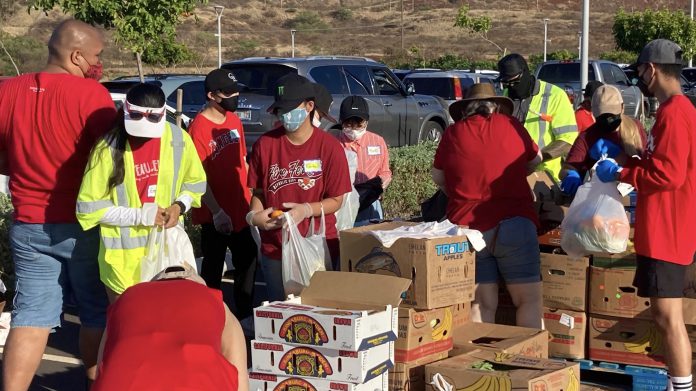The University of Hawaiʻi–West Oʻahu’s top priorities to address its students’ basic needs — such as food, housing, childcare, mental health, clothing, living expenses, and transportation — include connecting students to resources and services, and staffing to coordinate basic needs efforts across the UH West Oʻahu campus.
The findings are part of the first ever University of Hawaiʻi System Basic Needs Master Plan, developed by the UH Basic Needs Committee (UHBNC) to address the basic needs of many UH students. The plan features summaries for each of UH’s 10 campuses that include the current status of basic needs insecurity on each campus, existing programs and practices, and specific priorities and goals to meet each campus’ needs. Read UH West Oʻahu’s summary here.
“The Basic Needs Master Plan that was recently published highlighted the top priorities for UH West Oʻahu regarding basic needs security as: staffing and direct outreach to students,” said Dr. Xóchitl Mota-Back, a UHBNC member and an assistant professor of sociology at UH West Oʻahu. “Currently, UH West Oʻahu does not have any formal committee or body that is responsible for ensuring that outreach to students is consistent and that faculty and staff are trained to refer students to basic needs support, but this is in the works.”
Mota-Back said she facilitated last fall a gathering that included the Director of Student Life, Vice Chancellor for Student Affairs, a student representative from ASUHWO, and the Chair and Vice-Chair of the Faculty Senate, to collaborate on the various efforts that have been underway during the pandemic and how to centralize them moving forward.
“We are hopeful to establish a formal committee in the coming academic year 2022 to 2023 to facilitate this crucial work,” Mota-Back said.
In addition to the release last week of the UH Basic Needs Master Plan, UHBNC also announced it is hosting a webinar from 10:30 to 11:30 a.m. on Tuesday, March 29, via Zoom to help the UH community better understand basic needs insecurity in the student population. The event features Dr. Sara Goldrick-Rab, the founder of the Hope Center for College, Community, and Justice and a leading expert on student basic needs insecurity in higher education. She will present data from the #RealCollege Survey, the nation’s largest, most well-established assessment of students’ basic needs insecurity.
Mota-Back encourages the UH West Oʻahu community to attend the event.
“There are so many wonderful models of campuses and state university systems for UH to emulate to address the wide-ranging disparities that can exist within even a single student body,” Mota-Back said. “We can all learn how to better understand how social, economic, political events shape the lives of our students, the university, and the conditions under which students are asked to perform. Basic needs insecurity is both a micro and a macro problem and require a comprehensive framework, which is the specialty of the HOPE Center and driven by Dr. Goldrick-Rab.”
Mota-Back added that it is important for everyone to be part of the effort to address students’ basic needs insecurity.
“There is no way for any one person or office to successfully address basic needs insecurity,” she said. “Basic needs include everything from knowing how to access FAFSA, SNAP, and WIC; where to get free or low cost food; childcare subsidies; mental health support; safe and secure housing; and so on.”
Mota-Back continued, “Not only do we need collective buy-in and support from administration, faculty, and staff, we need to be in community with the land, resources, and organizations of where we reside.”
